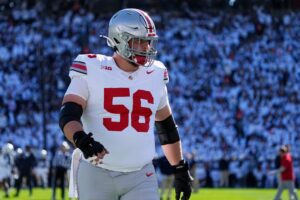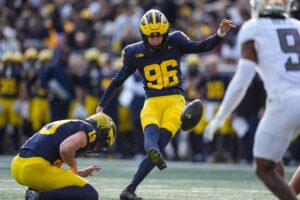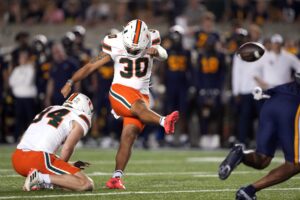A good quarterback can make a world of difference, and Cincinnati has a good one in Desmond Ridder.
A junior out of Louisville, Kentucky, Ridder has all the physical tools you look for in a quarterback. His accuracy and ball placement are deadly, especially at close range. He has a great deep ball, and can even throw while on the run.
His mobility helps get him out of trouble in the pocket, and even helps in the run game.
Ridder only has one flaw as the Cincinnati quarterback. If he can address the issue, then Cincinnati can take a step forward in 2020.
Cincinnati Quarterback Ridder Needs To Fix One Flaw
Ridder’s One Flaw
The one thing Ridder needs to improve is going through progressions.
He has a bad habit of only making one read on each play. His arm talent is good enough that he can get away with it most of the time. He can still make an accurate pass when the primary read is well covered. His ball placement helps his receivers go up and grab the ball when the look isn’t favorable.
Cincinnati had a lot of talent around their quarterback Ridder last year. Joisah Deguara was one of the best tight ends in the 2020 NFL Draft class and was Ridder’s favorite receiver. Ridder liked to throw the ball up to Deguara and let the big tight end go get it. Deguara didn’t need to be open to be an option for Ridder. Between Ridder’s ball placement and Deguara’s ball skills, that was enough to account for 39 completions.
Alec Pierce and Malick Mbodj are going to be who Ridder looks to next to replace Deguara’s production. They have both shown the ability to go get the ball wherever Ridder puts it.
With a good passer and good receivers, it’s not a problem most of the time. But when Ridder and the Cincinnati Bearcats played great teams, Ridder’s weaknesses at quarterback were exposed.
The only losses on the season for the Bearcats came against Ohio State and Memphis. Those also happened to be the teams on their schedule. They were good enough to exploit the holes Ridder’s game. He needs to step improve if he wants to beat Memphis in 2020.
Why It’s A Problem For Ridder
Ridder’s inability to make secondary reads gets him into trouble.
It plagued him early against Ohio State in a game where the Bearcats’ offense didn’t score.
Cincinnati faced a first and goal, and the Ohio State defense looked like they were in man coverage. But from zone, Shaun Wade tipped the ball so Tuf Borland could pick it off.
Ridder didn’t notice the change in coverage and tried to force the ball to Pierce. Deguara or Rashad Medaris probably would have been better options on that play. They were on the left side of the field, but Ridder didn’t look there. He was looking at the right side where both the receivers were well covered.
On this play against Houston, Ridder didn’t seem to notice that Mbodj wasn’t ready to receive the pass. Mbodj had just gotten bumped and the defender was all over him. Ridder should have once again looked to the other side for Deguara.
Notice how on both of these plays, Ridder’s head doesn’t move. He is only looking at his primary read, which turns out to be a poor decision.
https://youtu.be/utrOXWffciY?t=90
Ridder’s accuracy faded as the season wore on, mostly due to a shoulder injury. He rested in the last week of the regular season against Memphis, but played in the rematch a week later. Against Memphis in the American Athletic Conference Championship Game, Ridder threw a costly pick late in the game.
He was looking for Tre Tucker downfield, but Tucker never got open. Chris Claybrooks had him locked down. The only way that throw works is if Ridder just hurls it deep and hopes Tucker can outrun Claybrooks for it. But there wasn’t much separation there, so that would be a longshot.
Ridder would end up getting jostled in the pocket and throwing an interception. That play was dead from the start, though, as it would have taken a spectacular play from Tucker to make it work.
How To Fix The Problem
There are a few ways Ridder can grow out of it, or even mitigate it, in 2020.
Coaching can help fix the issue, but in Luke Fickell‘s fourth year as the head coach and Mike Denbrock‘s fourth year as offensive coordinator, the coaches should have ironed this out by now. This will be Ridder’s third year as the Cincinnati starting quarterback, so he should be past it.
But quarterbacks coach Gino Guidugli has added the passing coordinator position to his duties, so he can help Ridder learn how to go through his progressions.
The coaching staff can also help him through scheme. They do have some plays that normally have only one read, like RPOs and screens. Ridder tends to do well on single-read plays.
They can also help Ridder by moving him out of the pocket. Ridder’s accuracy on the move is strong, and his mobility helps keeps him safe from blitzing defenders. Moving the pocket means the defenders have to keep moving to stay with him. They can’t sit in their zones, and they have to be cautious while in man coverage.
If Cincinnati can help Ridder overcome his biggest weakness, his quarterback play will take the team forward. The American Athletic Conference is theirs if Ridder ups his game.






